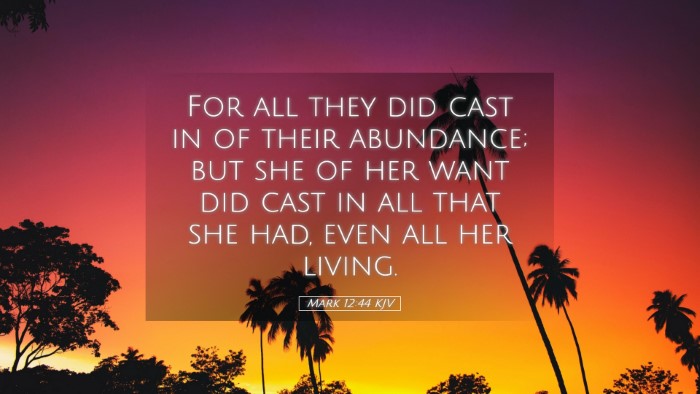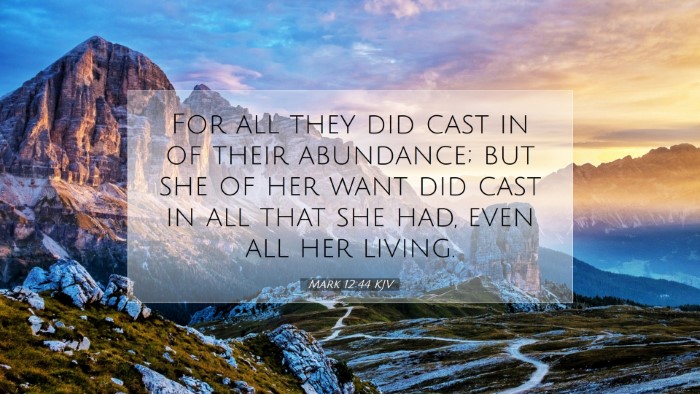Commentary on Mark 12:44
Mark 12:44 states: "For they all contributed out of their abundance; but she, out of her poverty, has put in everything she had, all she had to live on." This verse captures the profound expression of faith and generosity exemplified by the poor widow, contrasting it sharply with the contributions of the wealthy.
Contextual Overview
In the broader context of Mark 12, Jesus is teaching in the temple, addressing various groups including the Pharisees and Sadducees. The account of the widow’s offering follows his criticism of the scribes who devour widows' houses while putting on a show of righteousness. This sets the stage for highlighting the genuine faith of the poor widow against the backdrop of hollow religious practices.
The Generosity of the Widow
-
Contrast with the Rich:
The widow's offering is small by worldly standards—merely two small coins—but it represents a far greater sacrifice. As Albert Barnes observes, her contribution is significant because it comes from her need rather than her surplus. The wealthy give from a place of abundance, often lacking the same sacrificial spirit.
-
Faith and Dependence:
Adam Clarke notes that the widow gave not only financially but demonstrated a complete trust in God’s provision. By giving everything she had to live on, she embodies the idea of total dependence on God, an act that reflects her faithfulness and reliance on divine sustenance, contrasting with the self-sufficient ways of the affluent.
-
God’s Perspective on Giving:
Matthew Henry expounds that God does not value the size of the gift but rather the heart behind it. This woman understood the importance of devotion over material wealth, a stark reminder that God looks at the heart (1 Samuel 16:7) rather than the outward appearance. Her small offering speaks volumes about her love and commitment to God.
Theological Implications
-
The Nature of True Worship:
True worship is not determined by how much one gives, but by the spirit of giving. The widow’s act serves as a powerful reminder that God honors sacrifices made out of love and faith. As Matthew Henry articulates, her offering is a model of deeper spiritual devotion, transcending mere financial contributions.
-
Encouragement for Believers:
This passage encourages believers that even the smallest acts of service and kindness are vital in the eyes of God. Albert Barnes emphasizes that every believer can contribute, regardless of material wealth, underscoring the idea that heart and intention are of primary importance.
-
Social Justice and Compassion:
The account has social justice implications, as it highlights the plight of the widow, an archetype of vulnerability in society. Adam Clarke mentions that the widow is a call for society to care for the marginalized and less fortunate. The greater admonition lies in the importance of supporting those in need rather than exploiting them, as seen in the critique of the scribes.
Practical Applications
-
Evaluate Motivations:
Believers are encouraged to evaluate their motivations for giving. What does your offering signify? As Henry suggests, giving should stem from a heart of love rather than obligation.
-
Embrace Generosity in All Forms:
Generosity extends beyond monetary gifts. How can one give time, skills, and resources in service to others? Clarke urges believers to reflect on their capabilities and how they can serve the Kingdom in various capacities.
-
Trust in God’s Provision:
Following the widow's example, believers can learn to trust in God even amid scarcity. This verse serves as a reminder that God sustains us and that sacrificial giving often brings about divine blessings beyond material wealth.
Conclusion
Mark 12:44, particularly the widow's offering, is a powerful narrative that compels both an introspective examination of faith and a call to action. From the insights provided by commentators like Matthew Henry, Albert Barnes, and Adam Clarke, we see that true devotion is not limited by financial capability but is defined by the sincerity and sacrifice of the heart. Pastors, students, theologians, and scholars alike can find wisdom in this text, inviting deeper reflections on our giving, our trust in God, and our care for the needs of others within the community.


